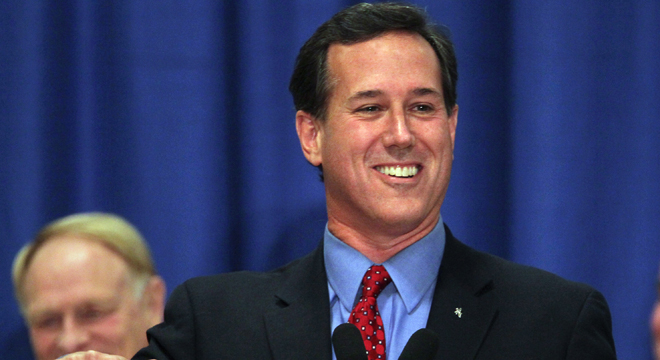Rick Santorum won primary victories in Alabama and Mississippi on Tuesday, according to network projections, bolstering his credibility as Mitt Romney’s top challenger and denying the former Massachusetts governor an opportunity to solidify his status as inevitable nominee. With most of the vote counted, Romney appeared likely to finish third in both races, with Newt Gingrich poised to take second.
“We did it again,” Santorum declared at an election night rally in Louisiana, saying his underdog campaign was about “ordinary people doing extraordinary things.”
The races were among the first high profile contests in which both Gingrich and Santorum, who have alternated wildly between surges and collapses, were competitive at once. The predictable result: they split the conservative anti-Romney vote closely and threatened to give the frontrunner a game changing victory right as his campaign is struggling to assert its dominance.
Santorum is hoping a string of southern victories will help narrow the race down to a clear two-man contest with Romney by eliminating any plausible path to contention for Gingrich, who lags behind in delegates and has only won two contest so far — one in his home state of Georgia. The former Pennsylvania Senator and his aides, while stopping just short of calling on Gingrich to drop out of the race, have warned since Super Tuesday that Newt could spoil their efforts to unite conservatives skeptical of Romney before it’s too late.
“It’s very, very clear that outside of you know, Speaker Gingrich’s backyard if you will, we’re the candidate who’s taken it to Mitt Romney,” Santorum said in a phone interview with FOX News on Tuesday. He added: “They want a conservative nominee, and the best way to get that is for us to have a one-on-one opportunity with Governor Romney.”
But Gingrich’s campaign, while identifying the southern states as crucial, has shown little sign of preparing to leave any time soon regardless of the results. In an election night speech on Tuesday, Gingrich slammed Romney repeatedly by name, saying the two “conservative candidates” scored more than two-thirds of the vote in each state and joking that “if you’re the frontrunner and you keep coming in third, you’re not much of a frontrunner.” But he made clear he was still the one to ultimately knock him out, saying he planned to “go all the way to Tampa,” where the Republican party will hold its nominating convention.
“I emphasize going to Tampa, because one of the things tonight proved is that the elite media’s effort convince the nation that Mitt Romney is inevitable just collapsed,” he said.
Romney downplayed the importance of the deep South primaries on election night, choosing to spend Tuesday watching the results in a New York hotel room. But his campaign and its allied super-PAC launched an intense effort to win in Mississippi and Alabama, spending a fortune on advertising and barnstorming both states. A Democratic media observer noted Romney and the super-PAC outspent Santorum and his super-PAC by 5:1 in Alabama and 3:1 in Mississippi, characteristic of the big spending that has marked Romney’s most competitive efforts.
Romney may have felt better about Alabama than Mississippi — at an event in Mobile, AL Monday, Romney said “we’re going to win tomorrow.”
As the above quote suggests, Romney didn’t really play the expectations game very well. He told CNN Tuesday afternoon that Santorum had reached the “desperate end” of his campaign. The delegate count still favors Romney — something you’re likely to hear a lot of in the coming days — but there’s no doubt that Santorum’s wins Tuesday make Romney’s quote to CNN look premature at best. It didn’t help that Romney spokesman Eric Fehrnstrom walked back Romney’s Alabama prediction by saying after the state was called that the campaign never expected to win either race.









